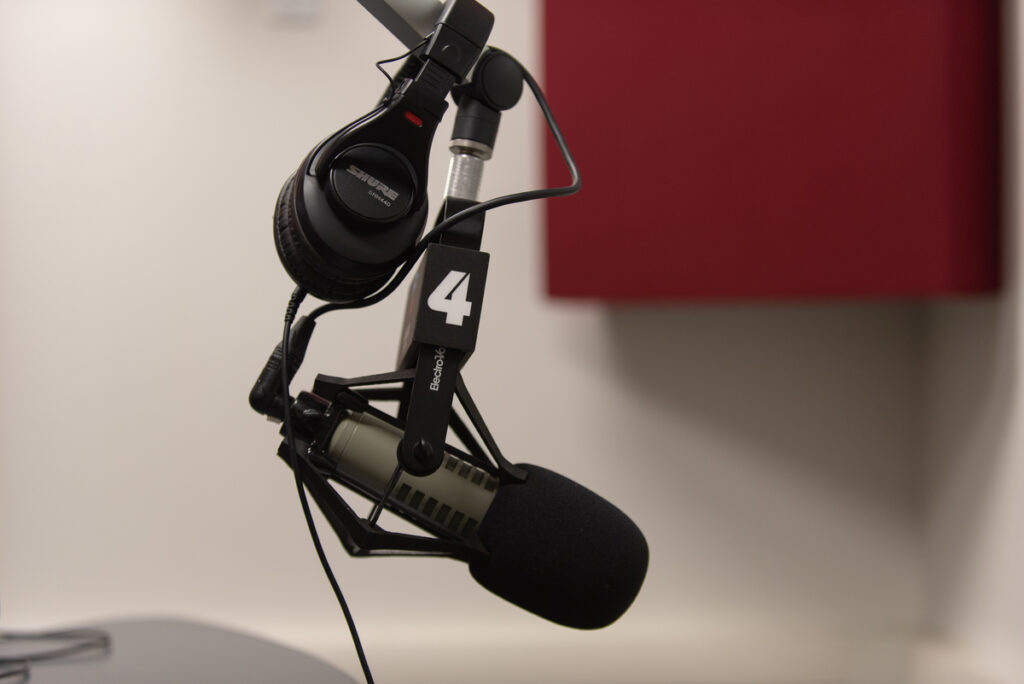Our world is full of constant noise.
Between notifications of breaking news headlines, social media posts, or controversial tweets from polemic politicians, it seems impossible for anyone with access to the internet to stay quiet all day.
Contributing to this omnipresent online noise is the modern phenomenon of podcasts, of which there are around four million.
According to a study published by Statista, listeners to these 4 million podcasts have been steadily growing since 2020, reaching a record high of about 76 million this year. The study also predicts that listenership will grow steadily over the next five years, reaching a record high of 113 million in 2029.
Of these podcasts, only 15% of the top-ranked podcasts are news-focused, according to Pew Research Center. Instead, the most-listened-to podcasts focus on entertainment. The most popular topic is true crime at 24%, followed by “multiple topics” at 20% and “other” at 12%. The remaining 44% are self-improvement, politics, sports, entertainment, and other niche topics.
The abundance of podcasts comes from how easy they are to create: anyone with a microphone can create one. One of the reasons podcasts are so popular, at least for me, is their colloquial nature. If you're a celebrity who already has a fanbase, you can create a podcast that quickly gains listeners.
Podcasts are a relatively low-risk medium because they're often informal and non-visual. According to Entertainment Weekly, podcasts can be created without direction or control, which allows celebrities the opportunity to generate instant cash from the creative freedom to build on their existing fame.
Celebrities can record themselves saying anything, really anything, and become instant successes on their podcasts. Influencer podcasts are not intended to benefit the listener. They are a narcissistic endeavor, a money-making scheme that gives celebrities a platform to boost their sense of self-importance.
The steady growth in podcast listenership has paralleled the customary increase in the presence of these celebrity podcasts: Just this year alone, the SmartLess podcast, hosted by actors Jason Bateman, Will Arnett and Sean Hayes, signed a $100 million deal with Sirius XM to host the podcast for three years, according to The Guardian.
Additionally, “The Joe Rogan Experience,” the ever-controversial and ever-popular podcast featuring the famous UFC commentator, just inked a $250 million deal with Spotify that will make the podcast available on other platforms, including Apple Podcasts and Amazon Music, Variety reports.
The Guardian explains this multi-million dollar phenomenon in the context of the history of podcast culture, which is rooted in conversation: The podcast format itself lends weight to celebrity, the article says, and that “two celebrities with an hour of free airtime and a premium Zoom subscription could make the world a better place.”
Even if the celebrities' intentions are good, there's an inevitable disrespect that comes with producing a celebrity podcast. “New Girl” star Jake Johnson hosts a podcast with actor Gareth Reynolds called “We're Here To Help,” and the whole purpose of the show is to give advice to people who call in with a problem.
This isn't the first celebrity or influencer podcast to follow the format: former “Buzzfeed: Unsolved” and “Worth It” stars Shane Madei, Ryan Vergara and Steven Lim co-host the podcast “Here's What You Do” on new platform Watcher Entertainment.
Even if these podcasts are well-intentioned, there's an inherent selfishness to feeling entitled to dole out advice simply because you have an audience.
This isn't to say that celebrity podcasts don't benefit or entertain their listeners; there's clearly a reason why they have an audience. Jenna Fischer and Angela Kinsey's “The Office Ladies” provide behind-the-scenes information from the cast of the hit show “The Office.” Brittany Broski's “The Broski Report” is one of my favorites and has helped propel TikTok and YouTube influencers to new levels of fame.
These podcasts are fun and their hosts are lovable, but they benefit from their established celebrity status: The Office Ladies strictly reminisce about the show that made them famous, and Brittany Broski talks about whatever she wants, so much so that the podcast is almost a replica of her YouTube channel.
With 4 million podcasts and 76 million listeners, it's hard not to think that celebrities are monopolizing our time. One media platform just isn't enough. If one online industry succeeds, podcasts will succeed, and so will theirs.
Influencers and celebrities aren't creating podcasts with an audience in mind — they already have one, they're just looking for another, easier way to keep their audience's attention for longer.
Feature image: Aidan Cahill/The Phoenix

